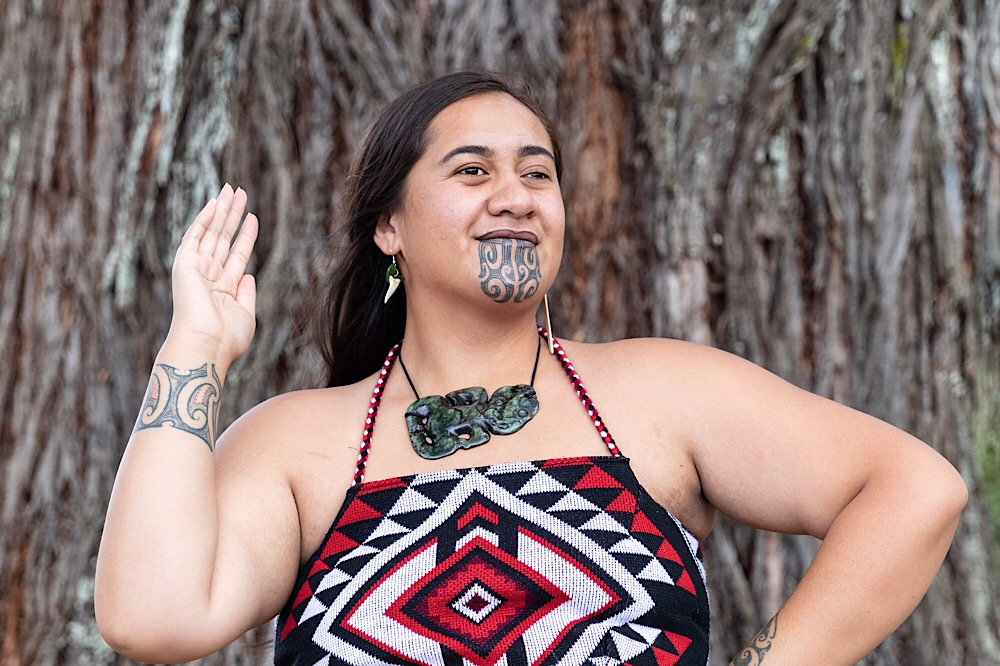Te Aorangi Murphy-Fell
Bachelor of Business with Honours

Waikato
Like many others, Ngā Wai hono i te po Paki lives, breathes, and simply is Kapa Haka.

With a rich family heritage in the art form going back many decades, she is following in the footsteps of her elders. As the only daughter and youngest child of Te Arikinui Kiingi Tūheitia, she carries her birthright in the Kīngitanga with her when she performs and competes.
Ngawai (Waikato) is with Nga Pou o Taniwharau. After a Sir Edmund Hillary Scholarship to study for her BA, at 22 she is now doing her masters degree in Tikanga Māori. When she was in her second and third years at University of Waikato, Ngawai got a job teaching Kapa Haka. That was a way for her to play with her creativity in the medium. She was also involved with primary and secondary schools, so was constantly in Kapa Haka. Is there a day in her life when Kapa Haka isn’t present? “Not really. I walk around my house and I see a taiaha. I get into my car and my poi is on the seat. I go home to my parents house and my little nephew is there and he’s trying to do the Haka. So it is just everywhere. I’ve been brought up in it, I am it. A lot of people are Kapa Haka. It’s the embodiment of Māoritanga.”
Her earliest memory of Kapa Haka was when she was about three years old and her parents were performing at Matatini 2000. “I was practising all my pūkana in front of a mirror in the hallway of our old house at Waahi Pā, when my mother walked passed behind me and just cracked up. She said, ‘It’s probably going to be you one day.’ Then she was off to perform with Taniwharau. I was brought up in Taniwharau. I’ve even got a song that was written for me when I was a baby, and they performed it in 1998.”
Ngawai’s first taste on the stage at Te Matatini was in 2013 when she was invited to join her tutors on stage in the senior competition. “That was an amazing and rewarding feeling. From then on I tried to engage more in this world we call Kapa Haka. I leant how to use the patu, I went to Ōpōtiki with Te Kahautu Maxwell and learnt how to Haka, and how to get low. And now I am home.”
The joy of the creativity Ngawai finds in Kapa Haka is almost tangible when she talks about it. “I love being able to take from different places and create some magic. It’s crazy how you feel once you come up with something. An example was at Secondary Nationals in Hastings 2015. There were three of us (all Hillary Scholars) trying to figure something out for a poi bracket. We tested new things, I thought about how I’d never hit the poi on the ground before. We tested it out, then took it back to our tutor and she loved it. Just from playing and experimenting with things you can do with a poi -- it opens your creativity up so much, it is amazing.”
Ngareta Takiari. But I try not to have an idol, I try to just be myself.
Mōteatea. Because it is not set. It’s traditional and embodies how you feel and what you’re thinking. My second favourite is Whakaeke, because it’s a strong statement.
Just go for gold! That means committing yourself, and giving 100% all the time because a perfect practice makes a perfect performance. Te Waiora is a great place for kaihaka who are new to University. It helps to constantly build on your skills, your wairua, your Haka. There are so many Haka idols in there, and it surprises me how many kaihaka have been through the group. You can see it when everyone comes back for Koroneihana and takes the stage, it’s just like a big fat boom!
A lot of people interpret Kapa Haka in different ways, some people use it for fitness. Mine is an all over thing, because it is good for me mentally and physically. And it’s good for my soul. It IS me. When I don’t do Kapa Haka I feel it. When I didn’t perform at Te Matatini in 2015, I was sitting in my university dorm watching all my friends on stage. I was literally crying.
Kapa Haka also enhances your study. It’s the discipline and the ethics. I also put my knowledge of Kapa Haka into my studies. If you take a look at a lot of my assignments, you’ll see references to songs I have performed myself, and that I love. It’s about being able to connect those two, that’s what makes me tick. That’s what makes me like the University of Waikato so much; that I actually have something I want to talk about, and that I actually want to study. It’s my own history. Also at Waikato, we have kaiako who are incredibly knowledgeable, like Pou Temara and Te Kahautu Maxwell. The whole A Block staff, they just understand the Māori world view.

You’re currently viewing the website as a domestic student, you might want to change to international.
You're a domestic student if you are:
You're an International student if you are: